- Home
- A. J. Hartley
The Mask of Atreus Page 4
The Mask of Atreus Read online
Page 4
“Slow down, honey,” said the operator.
She had started off methodically enough (multiple knife wounds…) but it had all gotten away from her. Her voice had cracked and she had started babbling.
“Sorry,” Deborah answered, feeling suddenly stupid and alone. “I’m a bit… I’m…”
She didn’t know what she was, or couldn’t find words that began to represent what she was.
“It’s OK. Just take a breath.”
The dispatcher didn’t warn Deborah that wasting police time with hoax calls would get her in a world of trouble, despite that remark about the secret room (which was enough to test anyone’s credulity) or her jabbering about Atreus. The woman could hear that it was all real, and that meant that Deborah had to start getting things together, because she was losing it badly. She cleared her throat.
“I’m sorry,” she said again. “Richard was very… We were very close.”
“That’s the man who’s hurt?”
“Dead, yes.”
She said it quite calmly, her mind blank, the words somehow correct but meaningless.
There was a momentary silence.
“Where exactly are you?” said the dispatcher.
“In the bedroom,” said Deborah.
“I mean the address.”
“Right,” said Deborah, feeling numb and stupid again. “Sorry. It’s the Druid Hills Museum, One forty-three Deer-borne Street. The house is connected to the museum. You might have to come in that way. Not you, of course. Whoever comes—”
“Uh-huh,” said the dispatcher. “You could meet them at the door. Is it close by?”
“Not really,” said Deborah.
“OK,” said the dispatcher. “And this man who called, you have no idea who he was?”
“No.”
“Is there a safe room in the house? Somewhere you can lock yourself in and wait for the police officers?”
“There’s a bathroom,” she said, feeling again a surge of panic at the seriousness with which the woman was responding to Deborah’s mysterious caller.
“And you can lock it? And the door is solid?”
“Yes, but I’ll have to hang up. This isn’t a cordless phone. I have a cell I could use if—”
“OK, that’s good. You OK?”
“I’m OK,” she said. “I’m going to hang up.”
“You sure you’re all right?”
“Yes.”
“Just get in the bathroom and lock it up good, OK?” Deborah nodded, then said yes. Then she hung up and sat on the edge of the bed for a moment looking at the bathroom door. Then she looked away, stood up, took two steps, and peered into the dimly lit chamber behind the bookcase, keeping her eyes from the floor and the body upon it, taking in for the first time the remarkable—no, the impossible—collection that lined its walls.
CHAPTER 8
Even without stepping inside Deborah knew that the glass-fronted displays contained artifacts that matched the fragment of pottery she had held in her hands moments before. One of the cases on the walls was open, and there was a conspicuous vacancy on the glass shelf inside. Deborah looked down. In the corner shadows, three feet from that central square of light, was a random clutter of ceramic fragments, the remains of a pot, some of whose shards were of the same turquoise as the fragment she had found under the bed.
Deborah stayed where she was, staring hard over the body at her feet (Don’t look at him again, whatever you do.), her gaze moving slowly around the room’s perimeter in a kind of daze which increased as she absorbed the contents of those display cases: a gold, two handled cup she thought was called a kantharos, four decorative plates with stylized lions, and a pair of seal rings, also gold. There was a stone slab carved with the figure of a chariot and driver, possibly a gravestone, a silver bowl overlaid with bulls’ heads, strings of glass and polished stone beads, and then more gold: necklaces, pendants, diadems, rings, and pins, all remarkably delicate and rich. There were three cases loaded with ceramics, from finely painted jugs decorated with geometric patterns to elegant ky-likes and jars inscribed with warriors and hunting scenes. The last case held spear points, swords, and daggers, inlaid with gold and precious stones, slim and elegantly purposeful, their bronze green with age but remarkably undamaged…
If it is all real…?
There was no reason to suggest it wasn’t, except the obvious. There were forty or fifty pieces here. If they were what they appeared to be, this had to be the largest, richest collection of Mycenaean or Minoan artifacts outside the National Archaeological Museum in Athens. Its value was impossible to estimate.
So it has to be fake.
A collection of this size and quality just couldn’t exist. Most of the Greek sites had been excavated or plundered centuries before. Everything from Mycenae, Tiryns, the Minoan sites in Crete was catalogued, documented, the pictures reproduced in a hundred books devoted to art and history. A collection like this, unknown to modern archaeological science, was unthinkable.
But Deborah, rooted to the spot, her eyes still streaming with tears, knew at a glance that what she was looking at were not copies or reproductions of known pieces. True, she wasn’t an expert on Grecian antiquities and couldn’t identify every pot ever found in Mycenae, but she had seen enough of the famous ones to know that this little room contained objects as large, as richly ornate, as complex as any anywhere else. She also knew that these were different, similar enough to mark them out as Mycenaean, but new finds nonetheless. She stared at a bronze dagger held in place on a delicate Perspex stand, leaning into the room to get a closer look. It was adorned with inlaid gold and silver lions chasing deer. It was exquisite. It was three and a half thousand years old, and she was as sure as she could be that no serious archaeologist or historian alive had ever lain eyes on it.
No serious archaeologist.
What did that mean? She forced herself to admit the dull dread that had gathered like ground glass in the base of her stomach. Serious meant ethical. If this stuff was real, it had been stolen, kept secret, traded outside the purview of the archaeological community, squirreled away, its lessons and delights hoarded for private consumption only. She felt dread and a disappointment that left her drained and hollow, even stopping her tears with a sudden and emptying weariness.
“Richard.” She sighed. “What did you do?”
And, whispered a hurt and resentful part of herself she didn’t want to listen to right now, why didn’t you tell me?
She remembered Richard’s old Indiana Jones-esque righteous indignation: “This belongs in a museum.” Quite. It should have made her smile, but the hollowness in her bowels was turning into something small and sad. She looked at him again, lying there, pale and unfamiliar, striped and splashed with the garish red of his blood.
You were my friend, my mentor, my…
She couldn’t bring herself to add father. This hiding from her was a betrayal, of her, of her values, of what they had tried to do at the museum.
Unless…
Could he have bought this extraordinary collection through black market channels with a view to displaying it in the museum? She caught her breath. He had been distracted of late, secretive. But it had been a wait-and-see kind of secretive. Was this room merely a holding pen for use until the legal paperwork was all in order, and the collection could then be displayed in their humble museum? What a coup that would have been!
But the room didn’t look temporary. Her rush of hope and idealism floundered. Richard had been dealing with the worst kind of illegal artifact traffickers, and they had turned on him. What other way was there to read the evidence?
But they had been inside. So why hadn’t they taken it all with them? If this had been a botched deal, why leave all these extraordinary treasures behind? Why wouldn’t Richard’s killers just take the lot? If…?
Deborah spun around. Very slowly, almost noiselessly, the handles of the bedroom door were turning.
CHAPTER 9
Deb
orah had no more than a second or two to decide, and all options felt like gambles. Then, with the bedroom doors starting to swing slowly inward, she ducked and rolled into the only hiding place in the room: the space under Richard’s bed.
For a moment there was silence. Deborah was on her stomach, her legs pointed at the bed head, her face at the foot, only a couple of yards from the door. She held her breath and listened. There was no brash entry, no heavy regulation boots. Whoever was coming in had no business being there. She should have locked herself in the bathroom.
Deborah hugged the floor, palms spread. There was an oversized bedspread hanging over the mattress so that it touched the ground along most of the length of the bed. It afforded her childish hiding place a degree of secrecy, but it also made it almost impossible to see anything in the room beyond. Except in one spot. Right at Deborah’s waist on the left side, the bedspread was puckered up into a shallow V, created when she had slid under. Slowly she turned her head till she could see through the gap.
Carpet, the leg of an end table, the dim space behind the bookcase. Richard’s outstretched hand.
This is crazy. Get out now.
No. She didn’t like the stealth with which those doors had opened, the care with which those feet had entered.
It was a long moment before Deborah heard anything at all, so long that she had begun to think that the intruder had gone back out, but then it came, clear and distinctive: a long, expelled breath, perhaps a sigh. Deborah shifted fractionally, straining for a wider field of vision through the notch of fabric. It made no difference, but then whoever was in the room, only feet from where she lay, took two quick steps, and a pair of shoes came into view: white gym shoes marked with a Nike swoosh on the heel. Women’s shoes. They were turned to face the body and the secret room which housed it. As Deborah stared, they rocked forward on the toe, as if craning to see something, but then everything stopped.
The feet turned, pivoting sharply back toward the door, and then were gone. Deborah heard the door open and close again, a good deal less stealthily this time, and then dimly, farther away, she heard something else, male voices coming through the lobby downstairs: the police.
Now.
She rolled out in one quick movement, passed her hands over her clothes, and opened the bedroom door. Still on the landing, preparing herself for the officers coming up the stairs, was Tonya, the middle-aged maid, in the spotless Nike gym shoes purchased for her, no doubt, by a daughter or niece. Hearing the bedroom door, she spun around, her mouth open, and stared at Deborah with undisguised hostility.
CHAPTER 10
The two women considered each other in silence, momentarily oblivious to the sound of the uniformed policemen cautiously announcing their presence as they came up the stairs, one bald and fat but probably no more than thirty, the other lean and black.
“Miss Miller?” said the bald guy, looking from one woman to the other.
“Yes,” said Deborah, turning from the black woman with an effort. “In there.”
The two cops exchanged looks, and the bald guy moved toward the bedroom doors. He was gone no more than thirty seconds or so, but it felt like an age and a silent one at that. The other policeman hovered, looking embarrassed, as if he had interrupted a church service, though whether that was because he was dealing with two women or with one corpse, Deborah wasn’t sure. He said something, but Deborah wasn’t paying attention, was straining to hear the chatter of the bald cop’s radio as he emerged from the room. She thought he looked a little green but was putting a brave face on it. It was strange, she thought. She had been too consumed by her own grief at who the corpse was to have been horrified or revolted by it.
“I thought I’d get a jump on the day’s work,” Tonya was saying. “I knew there’d be a lot of cleaning up to do. We had a party in the museum last night.”
“And you, Miss Miller?”
“I’m sorry?” said Deborah, turning to the black cop. He had taken out a notebook and was watching her anxiously. He was probably terrified of getting the procedure wrong, she thought, feeling something oddly like compassion for him.
“I got a phone call telling me I needed to get back here,” she said. “It was a little before three, I think.”
It was now almost four. This was what Tonya called getting a jump on the day’s work?
“Did you know the caller?”
She said that she didn’t, and then went over her movements and the manner in which she had come to find the body. Tonya tried not to look like she was hanging on her every word.
“And you had never seen the room behind the bookcase before?” said the bald cop who had now rejoined them and taken over.
“I had no idea it was there.”
“Neither did I,” Tonya volunteered. She didn’t meet Deborah’s gaze.
“It’s going to be a little while before the crime scene team gets here,” said the bald cop. “Is there somewhere you can wait?”
They left the black cop to guard the bedroom, and Deborah led the way downstairs to the sitting room where she and Tonya perched on Queen Anne chairs, staring silently at the walls, while the bald cop paced, studying pictures and knick-knacks at random. Occasionally he made notes, as if proving himself to be a detective rather than a beat cop. It was twenty minutes before they heard a door slam at the front of the house. Then came the swelling babble of voices as an army of investigators and specialists moved in, lugging their equipment with them.
“Why don’t we move back upstairs,” said the cop. “In case anyone wants to talk to you.”
He seemed uncertain, but they followed his slightly faltering lead and took new seats on the landing in a pair of wing chairs, while the cop vanished to consult with whoever was in charge.
“I’m sorry about Richard,” said Tonya. It was abrupt, almost brusque: a concession of sorts, but one which stuck in her craw.
Deborah nodded but didn’t know what to say. Tonya was a good maid, almost too good in fact, and took the kind of pride in her work which suggested that the work of the museum itself was a colossal inconvenience. She was tough and forthright and—despite doing a job which surely meant she was used to being given instructions—resented any show of authority over her.
Any authority from you, at least, Deborah reminded herself. She seemed respectful to the point of docility where Richard was concerned. It was just Deborah she didn’t like. Deborah had put that down to the fact that she was Tonya’s boss while also being young and white and female, but she always felt that there was something else, something personal, a resentment she couldn’t quite put her finger on. Now Richard was dead, and Tonya was creeping around his bedroom in the middle of the night…
Don’t think about it. Leave the detection to the detectives. Let it go.
Deborah sighed and continued to watch as the house filled up with people, several armed with cameras and evidence bags and rolls of yellow tape. Occasionally people—men, they were all men—muttered to each other and gave her and Tonya sidelong glances, but for what seemed like a long time no one spoke to either of them, so that she began to feel like the audience of a strangely intimate and surreal performance. For a half hour, people came and went, talking and scribbling notes, lit by the occasional brilliant flashes of cameras from inside, and still no one spoke to her. A female police officer arrived after another twenty-five minutes, a heavyset, kindly woman who offered her water and tried to occupy Deborah’s eyes as the body—Richard’s body—was wheeled out of the bedroom on a covered gurney. A man she took to be the pathologist was talking to the detective who seemed to be in charge. He gestured with his hands, indicating something about fourteen inches long, then again with his finger and thumb showing a space about the width of the incisions.
The weapon.
“Miss Miller?” said the detective, as the medical examiner bustled away. “We’re ready for you now.”
He nodded to Tonya. “If you wouldn’t mind waiting here for a few minutes,” he said,
“we’ll be out to ask you some questions shortly.”
He was tall, about her height, square-shouldered and athletic, dark-haired and tanned. Most women would find him handsome, she thought vaguely, not bothering to wonder why she didn’t.
“I’m Detective Chris Cerniga,” he said. “Do you think you could step back in here?”
He said it delicately, as if the trauma of returning to the bedroom might be too much for her, though his earnest look faltered when she rose to her full height and strode in. He straightened up, throwing his shoulders back a little more than was strictly necessary, and followed her in past the black uniformed cop. There was another detective inside, a balding man in a stained synthetic suit. He was studying the bookcase as they came in and didn’t turn round.
“Dave,” said Cerniga. He turned to acknowledge the witness, and his gaze lingered on her. She was unexpected, it seemed, though why—beyond the obvious—was uncertain. “This is Miss Miller,” said Cerniga. “She found the body.”
“Detective Keene,” said the balding man, not offering either a hand or a badge. In fact, now that she had been brought to his attention, he acted as if she didn’t deserve it, turning back to the bookcase and considering the titles.
“I realize this must be very difficult for you,” said Cerniga, “but I was hoping you could answer a few questions.”
She nodded, mute. The bedroom was as she had left it, the hidden alcove behind the bookcase still open, its walls glowing with their strange treasures. Only the corpse was gone. The space on the floor where Richard’s body had been was stained a dark and telling crimson in the curiously focused lights that shone down, forming a rectangle around that very spot. The entire alcove had been marked off with crime scene tape. Deborah felt like she was seeing it all through someone else’s eyes, or that she was experiencing some strange waking dream where the world seemed skewed and unreal.
“Would you happen to know if the museum contains any ceremonial weapons?”

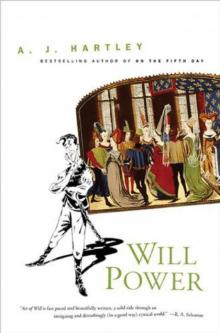 Will Power wh-2
Will Power wh-2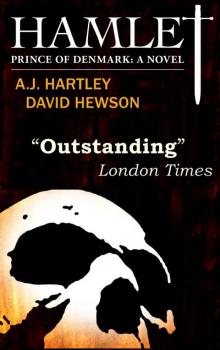 Hamlet, Prince of Denmark
Hamlet, Prince of Denmark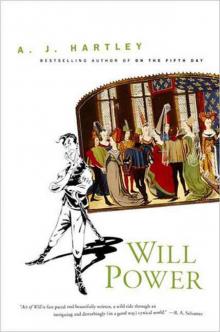 Will Power
Will Power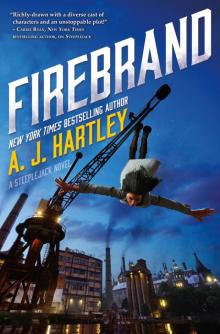 Firebrand
Firebrand A Novel
A Novel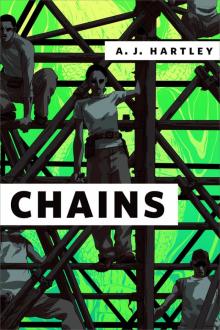 Chains
Chains Guardian
Guardian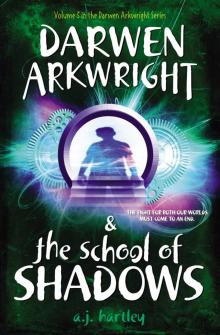 Darwen Arkwright and the School of Shadows
Darwen Arkwright and the School of Shadows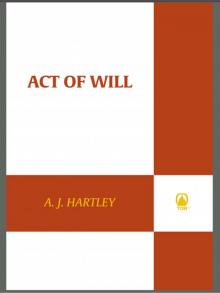 Act of Will
Act of Will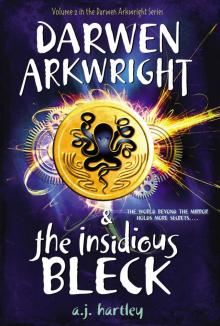 Darwen Arkwright and the Insidious Bleck
Darwen Arkwright and the Insidious Bleck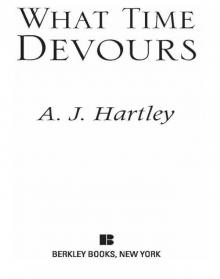 What Time Devours
What Time Devours